It’s common knowledge that meditation offers research proven benefits like increasing focus, reducing anxiety, improving sleep, greater emotional regulation, and many more.
However, there are several unexpected ways that meditation benefits kids. While these benefits may not be scientifically proven, parents, teachers, and kids themselves, can vouch for their efficacy.
Think about that for a moment. How many times in a day does a child have a chance to just focus on quiet self-care? Taking gentle breaths? Acknowledging their feelings with acceptance and not judgement? When kids enter a quiet meditative space they feel calmer and have better self-awareness and self-regulation. When kids experience the calm of meditation they are likely to seek meditation opportunities on their own, by asking for a favorite meditation story, using soothing techniques without prompting, and being better able to manage big emotions. Children who meditate are more peaceful, less reactive, and have more resilience.
When kids learn how to accept things, without judgment, they feel a lot better, inside and out.
Our minds are always judging things, sharing their opinions. In your mind, the mental chatter is incessant, and it goes something like this: “I’m too hot. I’m too cold, I wish it were sunny…I wish it would rain…” While these things are innocent enough, over time, we find ourselves upset because we are always judging, instead of accepting things around us.
Kids who learn to accept things as they are take it in stride when a playdate is canceled, when their favorite cereal is out of stock, or when the snow day they had counted on, doesn’t happen.
Another often overlooked skill that meditation encourages, and which greatly benefits kids is self-awareness. When kids are self-aware they can advocate for themselves, get their needs met, and set goals for their future because they know what they want.
Here’s an example. A child begins crying during computer time. They cry so hard they begin hyperventilating, and the teacher doesn’t know what’s wrong. The child’s friend whispers to the teacher, “Jimmy forgot his password.” If Jimmy had better self-awareness skills he could have asked the teacher for help before his frustrations escalated, setting off the emotionally draining and a physically stressful episode of tears.
When kids learn how to accept things, without judgment, they feel a lot better, inside and out.
Kids who learn to accept things as they are take it in stride when a playdate is canceled, when their favorite cereal is out of stock, or when the snow day they had counted on, doesn’t happen.
Kids who are calm, accepting and self-aware are often less reactive. They have better emotional regulation, which benefits them, their family, and those in their community.
At home, at school, and in the community, kids with emotional regulation have less tantrums, outbursts, destructive or risky behaviors. They form better relationships at home with their family members. They bond more with other children, and their teachers at school.
Kids with better emotional regulation have less emotionally uninhibited behaviors which keep them, and their classmates, from learning. If a child lacks self-regulation and acts out in class, that child isn’t learning, his teacher is spending time on their behavior, which detracts from his classmates’ learning.
∙Stay calm when dealing with big emotions or unexpected changes because they have the ability to accept things as they are and calm themselves down.
∙Have better peer relations because they take turns, play fair, share toys, and express their needs and emotions in a prosocial manner.
∙Control inappropriate impulses like taking another child’s toy, pushing in line, hitting, yelling or biting.
∙Reflect on poor choices they have made and make plans to behave better in future situations with less guidance from adults like teachers or parents.
As adults, we’re used to recognizing cues that we’re overstressed and over-stimulated. Kids don’t typically learn this skill, rather they push themselves too far beyond their ability to cope. Think of a young child at a carnival. They keep going and going until they conk out, and usually with a meltdown or two along the way. When kids meditate, they become in harmony with their minds and bodies. They learn to recognize cues their body is sending them, whether that is needing to eat or drink, rest, or even give themselves a quiet break from activity.
Time spent in meditation allows kids to become experts in their own needs as they learn to focus on becoming aware of things around and within them. Children who meditate care for themselves. They are kinder to themselves and care more about the feelings and emotions of others.
Developing the skills of imagination and visualization, which meditation does quite well, can enhance a child’s life in many ways. Imagination leads to creativity, problem-solving, and the ability to distance yourself from a problem. Think about this: when adults are stressed they often get away by taking a vacation or going out into nature. This time away gives them space to distance themselves from problems. It also supports the ability to creatively deal with stressors when they return.
In this same way, meditation benefits kids by offering “mini-vacations” where they can get away from whatever is on their minds. Meditation gives kids the space to see things in a new perspective. Having the ability to creatively problem solve boosts their autonomy and self-confidence which results in happier and more well-adjusted kids.
Preview our content and sign up to see how meditation can boost your child’s creativity and imagination!

